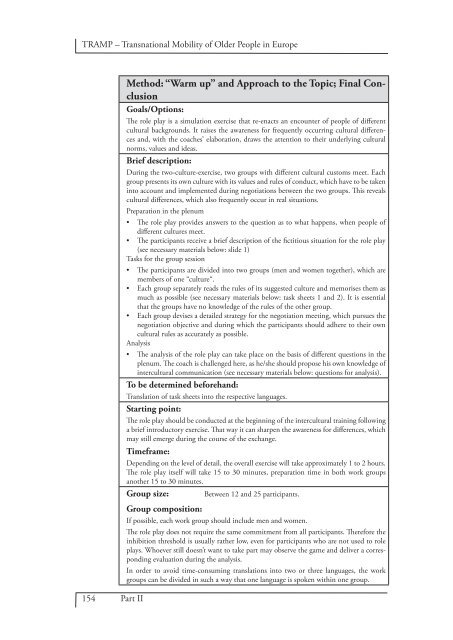Download - TRAMP - Arbeit und Leben DGB/VHS
Download - TRAMP - Arbeit und Leben DGB/VHS
Download - TRAMP - Arbeit und Leben DGB/VHS
You also want an ePaper? Increase the reach of your titles
YUMPU automatically turns print PDFs into web optimized ePapers that Google loves.
<strong>TRAMP</strong> – Transnational Mobility of Older People in Europe<br />
154 Part II<br />
Method: “Warm up” and Approach to the Topic; Final Conclusion<br />
Goals/Options:<br />
The role play is a simulation exercise that re-enacts an encounter of people of different<br />
cultural backgro<strong>und</strong>s. It raises the awareness for frequently occurring cultural differences<br />
and, with the coaches’ elaboration, draws the attention to their <strong>und</strong>erlying cultural<br />
norms, values and ideas.<br />
Brief description:<br />
During the two-culture-exercise, two groups with different cultural customs meet. Each<br />
group presents its own culture with its values and rules of conduct, which have to be taken<br />
into account and implemented during negotiations between the two groups. This reveals<br />
cultural differences, which also frequently occur in real situations.<br />
Preparation in the plenum<br />
• The role play provides answers to the question as to what happens, when people of<br />
different cultures meet.<br />
• The participants receive a brief description of the fictitious situation for the role play<br />
(see necessary materials below: slide 1)<br />
Tasks for the group session<br />
• The participants are divided into two groups (men and women together), which are<br />
members of one “culture“.<br />
• Each group separately reads the rules of its suggested culture and memorises them as<br />
much as possible (see necessary materials below: task sheets 1 and 2). It is essential<br />
that the groups have no knowledge of the rules of the other group.<br />
• Each group devises a detailed strategy for the negotiation meeting, which pursues the<br />
negotiation objective and during which the participants should adhere to their own<br />
cultural rules as accurately as possible.<br />
Analysis<br />
• The analysis of the role play can take place on the basis of different questions in the<br />
plenum. The coach is challenged here, as he/she should propose his own knowledge of<br />
intercultural communication (see necessary materials below: questions for analysis).<br />
To be determined beforehand:<br />
Translation of task sheets into the respective languages.<br />
Starting point:<br />
The role play should be conducted at the beginning of the intercultural training following<br />
a brief introductory exercise. That way it can sharpen the awareness for differences, which<br />
may still emerge during the course of the exchange.<br />
Timeframe:<br />
Depending on the level of detail, the overall exercise will take approximately 1 to 2 hours.<br />
The role play itself will take 15 to 30 minutes, preparation time in both work groups<br />
another 15 to 30 minutes.<br />
Group size: Between 12 and 25 participants.<br />
Group composition:<br />
If possible, each work group should include men and women.<br />
The role play does not require the same commitment from all participants. Therefore the<br />
inhibition threshold is usually rather low, even for participants who are not used to role<br />
plays. Whoever still doesn’t want to take part may observe the game and deliver a corresponding<br />
evaluation during the analysis.<br />
In order to avoid time-consuming translations into two or three languages, the work<br />
groups can be divided in such a way that one language is spoken within one group.


